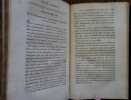SAY (Jean-Baptiste)
Traité d'économie politique, ou simple exposition de la manière dont se forment, se distribuent et se consomment les richesses ; troisième édition, à laquelle se trouve joint un épitome des principes fondamentaux de l'économie politique
1817 Paris, Deterville, 1817, 2 tomes en 2 vol. in-8 de LXXIX-452 pp. ; (4)-486 pp., 1 tableau dépliant, rel. d'ép. plein veau vert granité, dos lisses ornés de semis de fleurons à croisillons, roulettes et motifs romantiques dorés, encadrements de roulettes dorées sur les plats, pièces de titres et de tomaisons de maroquin rouge à grains longs, tranches jaspées, bon ex.
Reference : 13598
Troisième édition augmentée. Un des traités fondamentaux de la science économique française. ("En français dans le texte", 207). L'ouvrage est une synthèse de la pensée économique classique (Mercantilistes, Physiocrates, et Adam Smith).
Bookseller's contact details
Fronhofer Schlösschen Galerie
M. Bernard Esposito
Kreuzstrasse 3
97775 Burgsinn
Germany
+49 9356 6034856
Payment mode

Sale conditions
envoi des livres à réception du règlement virement bancaire, PayPal.
2 book(s) with the same title
TRAITE D'ECONOMIE POLITIQUE ou simple exposition de la manière dont se forment, se distribuent et se consomment les richesses. Troisième édition à laquelle se trouve joint un épitome des principes fondamentaux de l'économie politique
P., Déterville, 1817. Deux volumes in-8 reliés demi basane (rel. de l'époque), tranches jaunes mouchetées de rouge, piéces de titre rouge et piéces de tomaison bleu foncé, LXXIX-452 et 486 pages.
Un fondamental de la thérie de J-B Say :"Les produits s'échangent contre des produits" La librairie fermera ses portes en 2025. Des remises de 25 à 50 % peuvent s'appliquer au cas par cas.
Traité d'économie politique, ou simple exposition de la manière dont se forment, se distribuent et se consomment les richesses. Troisième édition, à laquelle se trouve joint un épitome des principes fondamentaux de l'économie politique.
Paris, Deterville, 1817. 2 volumes. 79, (1), 452; (4), 486 pp. 8vo. Contemporary tree calf, spines richly gilt in compartments, red labels with gilt lettering, very lightly worn. Kress 7041; Goldsmiths 21737; Teilhac 376; this edition not in Einaudi and not in Mattioli. Third edition. Jean-Baptiste Say is primarily remembered for Say's Law: 'that supply creates its own demand'. Say never resolved his differences with Ricardo as to whether value was based on labour or utility, but in an attempt to clarify his position in 1822, Say spoke of 'the quantity of useful things' as being crucial. In his correspondance with Sismondi and Malthus, he came finally to reconcile Say's Law with their theories of aggregate disequilibrium. Say was a policy-orientated economist rather than a model builder like Ricardo. In his introduction to the new restrictions added to his chapter on the law of the markets, Say remarked: 'Now, we are studying practical political economy here. To Malthus he wrote: 'It is better to stick to facts and their consequences than to syllogisms' (New Palgrave, iv, p. 249).


(NVVA, )
Phone number : 31 20 698 13 75
 Write to the booksellers
Write to the booksellers





